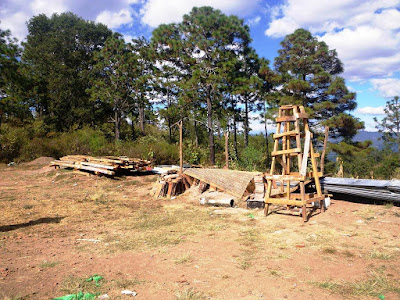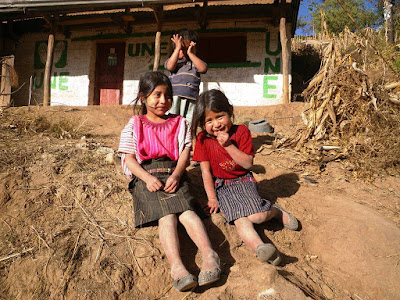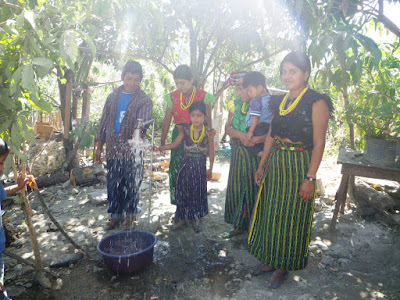The Spanish word for “party”, as in politics.. like a political party, is “partido”.
“Partido” also means “game”, as in sports or a match, like a game of soccer... or maybe a game of cards or Monopoly.
I don't know if anyone else catches the irony, but it struck me (not so) funny. And I think it captures quite well the Guatemala I've come to know.
I was actually first greeted at the airport not by my friends, as I’d expected... but by gun-armed soldiers, and circling army tanks and police cars with screaming sirens. I had arrived, unknowingly, into Guatemala on the day of the Change of the President, newly voted in in the recent elections, and the whole airport area was blocked off.
I wasn't bothered (I smiled and asked to borrow a cell phone). It was quite a fitting introduction to the country actually, in retrospect, for this time around. It kinda summed up the rest of my trip – stumbling quite inadvertently into the country’s political “present”. I'd become quite closely acquainted with its past in my last visit in 2009, but not much of its present reality, as I found out. And I would find out over the course of 2 weeks that followed this first day, Guatemala today is HIGHLY politicized.
No one (except a select few friends) wants to talk politics, I know that. But in Guatemala – you’d have to be oblivious to not notice the political atmosphere. Almost EVERY house, it seemed, even way in the deep of the most remote villages, was splashed with one of the main political parties’ symbols, sometimes with a big red X across the symbol, which I first thought was graffiti until I noticed “Vota Asi” scrawled on it too, meaning “Vote this way”. (this picture is from the town... I didn't think to get a picture of the ones in the villages til I'd already left)
Everywhere, city and countryside... Guatemala does rather resemble like a Monopoly board, after everyone's got their pieces all over each property. There is hardly a house....
.. or roadside..
..or TREE.....
.. or even ROCK..
... that stands unclaimed.
Guatemala is working towards democracy.... but at present, it is more a game of partisan politics – democracy boiled down to electoral campaigns, with a lot of empty promises, corruption, propaganda and personal/selective rewards for allegiance...
And in effect, almost nothing of real substance, at least for the rural Mayan populations.
On the drive out from the community of San Francisco that day, as I sat flustered and fuming in the truck, I saw a big billboard a smiley political candidate with the slogan “Human Rights for All”.
!!!!!!!!!!!!!!!!!!!!!!!!!!!! LIES !!!!!!!!!!!!!!!!!!!!!!!!!!!
Yes, I did actually yell that out loud. In a car-ride appropriate volume; I had that much constructive self-restraint.
It’s not hopeless... but there is a long way to go before that rings true.
San Francisco is pretty special... but by no means unique. Poverty is closely tied to land in Guatemala – it always is, when the land is livelihood. But land ownership in Guatemala is HIDEOUSLY skewed – one of the most inequitable in Latin America, and in the world. Roughly 2% of the population owns 70% of the land. And that means, while wealthy land-owners sit pretty on profits from exploitative labour and international exports (coffee, cacao, sugar) from their large-scale plantations... communities like San Francisco are left scraping an existence of making cropland out of a mountainside never meant to produce food.
On the drive out from the community of San Francisco that day, as I sat flustered and fuming in the truck, I saw a big billboard a smiley political candidate with the slogan “Human Rights for All”.
!!!!!!!!!!!!!!!!!!!!!!!!!!!! LIES !!!!!!!!!!!!!!!!!!!!!!!!!!!
Yes, I did actually yell that out loud. In a car-ride appropriate volume; I had that much constructive self-restraint.
It’s not hopeless... but there is a long way to go before that rings true.
Reshuffling the deck would seem to be SUCH an obvious solution - but if only it were so easy. Land has been at the very heart of violent conflict in Guatemala since conquest and colonization, and all the way through recent history. As a case-in-point, in the 1960's, a socialist President seized land from the wealthy owners and re-distributed it to peasants... the brief "success" ended in a coup, a series of repressive dictatorships... and in/through/alongside/birthed within all that politics, a 36-year campaign of terror and genocide against the Mayans that would leave 40,000 to 50,000 people "disappeared" and 200,000 people brutally slaughtered in its wake. I had met a survivor of torture and heard his personal story when I was in Guatemala in 2009. Uggh. History is so ugly... and still. so. present. A Peace Accord that “officially ended" the war was signed in 1996, but the reigning legacy of disproportionate power, land, oppression, injustice, and poverty remains.
But that's not the end of the story.
At the heart of it, I believe that Jesus is already at work to bring about the redemption of poverty. His Kingdom Come will be one of justice, peace, and redemption of ALL that is broken and ugly. That's the Good News - to which we are called to respond. And that is what what makes my work a hope-filled, worthwhile joy.
To that end...
At the heart of it, I believe that Jesus is already at work to bring about the redemption of poverty. His Kingdom Come will be one of justice, peace, and redemption of ALL that is broken and ugly. That's the Good News - to which we are called to respond. And that is what what makes my work a hope-filled, worthwhile joy.
To that end...
.. this is Luisa. She’s one of the staff of HOPE’s local partner in Guatemala. I instantly loved her, with awe-filled admiration. She is the legal expert on indigenous issues, land rights/conflicts, Guatemalan law, human rights in application, and all things political. I talked to her for all that 2 days (and a debilitating emotional roller-coaster (and consequent stretches of speechless silence)) would allow... all the issues that Guatemala faced, things that Guatemala needs. She was insightful, passionate, humble, down-to-earth... and brilliant.
Me (to Luisa): You know what Guatemala needs? It needs more people like you.
It really does. Passionate people with a vision for justice and a love for their own people. And have the training, expertise, and commitment to make it happen. Our partner organization alone could use at least 2 or 3 more staff like Luisa to work with the communities, just in the province of Quiche.
What is Luisa doing? More than I can comprehend, much less explain, she is working with communities to map out the specific complex disputes over their land, with a myriad of historical, political, multi-generational contributing factors, and from there, addressing the issues and parties involved. The law is not generally favourable by any means towards the Mayan communities. But there are things that need to and can be done. In San Francisco’s case, this looks like helping each family to get legal land rights over the land they are now living on. Proper documentation that will establish each family’s legally-binding rights over their land, as protection against the land-owners throwing them off the land again. It will protect the investments they are making to turn a piece of useless, infertile land into a livable and productive (and therefore more valuable) home. It plays every bit into the goal of long-term food security for San Francisco. It is critical to sustaining change.
There is more they are doing - educational programming (for all communities, like Chinanton too, where we have the water project) around citizenship – even in learning about health and sanitation, agriculture and whatever other practical needs, they learn about their civic rights and obligations... to the ends of informed communities, knowing their rights as citizens, understanding civic participation, and making demands of their local government. In Guatemala's context, that civic participation and engaging in politics IS absolutely part of meeting basic needs, and beyond. Development - the better-and-better, good-upon-good kind - will not happen without it. And as a "peace educator" at heart that had spent much of two years specifically studying/researching community-based, transformational education in developing country postwar contexts, I scoured every page of their 3-inch binder of their three-year education/training program... for my own interest -- it was good. Much more attune to the present reality than a literacy-and-peace program I had worked on a few years ago in another town. Figures! What do I know?? Not that I had any doubt, but I'm so glad there are people in Guatemala who know what they're doing!
I know (almost) nobody likes hearing about politics. So why am I telling you this? A UPEACE friend posed a good question. What’s a tougher battle? (1) Raising money for an effort to convert a piece of land that's not meant to be fertile into a cropland, or (2) Entering into a diplomatic dialogue with the land owners to negotiate some kind of peace?
Neither one nor the other, I think. I know I’M not personally going to be working on (2) - [diplomatic dialogue] - anytime in the near foreseeable future. But my work on (1) - [raising money that can support more of HOPE's work in Guatemala] - will make an important, immediate, tangible difference in San Francisco and communities just like it... and in some piecemeal sense, hopefully start contributing to (2).
Neither one nor the other, I think. I know I’M not personally going to be working on (2) - [diplomatic dialogue] - anytime in the near foreseeable future. But my work on (1) - [raising money that can support more of HOPE's work in Guatemala] - will make an important, immediate, tangible difference in San Francisco and communities just like it... and in some piecemeal sense, hopefully start contributing to (2).
Land, politics, and, now, politics as party games are at the very heart of Guatemala’s poverty.
It's a twisted, ugly, entangled complexity that's promised to be a tough battle to fight. But it's also a battle worth fighting (with constructive non-violence).
We can help to start re-shuffle the deck.










































